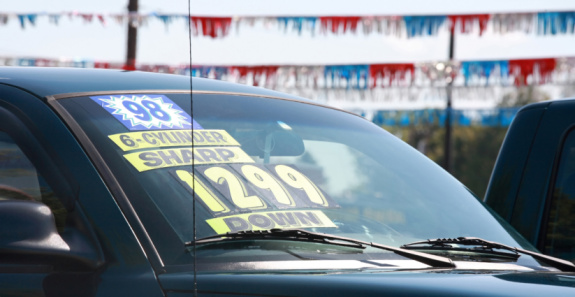
Car search engine and website ISeeCars analyzed more than 50 million used cars for sale by dealers between January 2012 and May 2014 and determined that a used car may be a potential scam if the asking price was abnormally below the average market value for the car. In other words, these deals looked like they might be too good to be true.
In June, U.S. consumers purchased an estimated 3.2 million used cars, about 2.3 times the number of new cars purchased in the month.
What ISeeCars discovered is that the lower the listing price of the car, the more likely it is that the deal is, in fact, too good to be true. The researchers found that a car priced at $12,000 or more has just a 0.3% chance of being listed at a price that is too low, or just three listings in every 1,000.
When the listing price drops to $3,000 or less, the chances of the listing being to too low rise to 5%, raising the risk by a factor of 16 that the listing is a scam. The smaller the dealer, the greater the likelihood of a scam, according to ISeeCars, and used cars more than 10 years old or with more than 100,000 miles are also more likely to be scams. The co-founder and CEO of ISeeCars said:
We found examples of car being advertised for much less than their market value or what they’re worth. The dealers’ hope is to lure potential buyers into the dealership in an attempt to sell them a different car or the same car but on an expensive financing plan. It may also be that the advertised car has some major undisclosed issue or it could be odometer fraud.
ALSO READ: Ten Cars Americans Don’t Want to Buy
As in transactions involving all sorts of goods and services, unequal access to information about a particular vehicle works in favor of the seller, not the buyer. There are some things buyers can do to level the playing field, according to ISeeCars:
- Do your own research at trusted information providers like Kelley Blue Book and Edmunds, which, like ISeeCars, will calculate prices for used cars. If the asking price is far below the calculated value, the car could be a salvaged vehicle (i.e., totaled by the previous owner’s insurance company and later purchased at auction and repaired by the seller) or have some other undisclosed problem.
- Dealers may also price cars extremely low to attract low-income buyers, who then borrow from the dealer to pay for the car and end up paying far more in interest than the savings the buyers anticipated from the selling price.
- Check the vehicle identification number (VIN) to make sure it matches the VIN on the advertised car.
- Buy and review the vehicle’s history report from a service like Carfax.
- Ask the dealer why the car is so cheap. He or she might accidentally tell you.
- Do some research on the dealer with the Better Business Bureau or ISeeCars, and seek other reviews as well.
- Have the vehicle inspected by an independent mechanic.
If you are planning a weekend visit to a dealer looking for a good used car after all the barbecuing and festivities, don’t be dazzled by the fireworks. Take a close look at the details beforehand.
ALSO READ: Gas Prices Rise Above $4 in Several States
In 20 Years, I Haven’t Seen A Cash Back Card This Good
After two decades of reviewing financial products I haven’t seen anything like this. Credit card companies are at war, handing out free rewards and benefits to win the best customers.
A good cash back card can be worth thousands of dollars a year in free money, not to mention other perks like travel, insurance, and access to fancy lounges.
Our top pick today pays up to 5% cash back, a $200 bonus on top, and $0 annual fee. Click here to apply before they stop offering rewards this generous.
Flywheel Publishing has partnered with CardRatings for our coverage of credit card products. Flywheel Publishing and CardRatings may receive a commission from card issuers.
Thank you for reading! Have some feedback for us?
Contact the 24/7 Wall St. editorial team.




